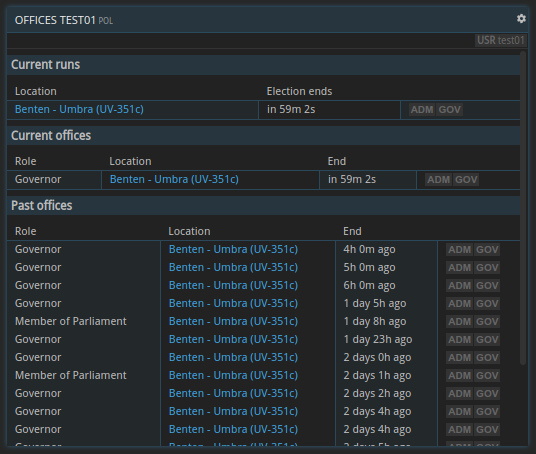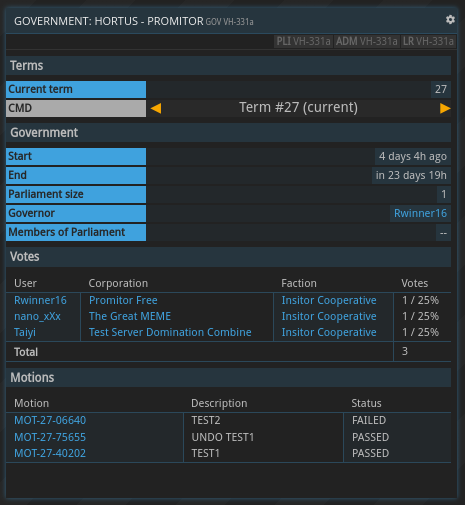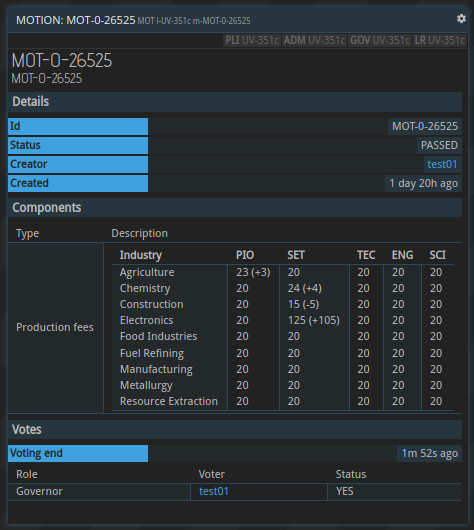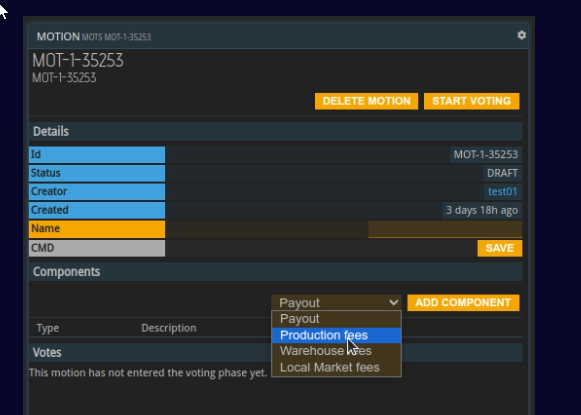Hey everyone,
we are close to the release of our politics themed update. If you follow our dev logs you might already know a lot about the upcoming changes, but judging from discussions and comments on Discord and our test server there are a lot of open questions how everything is supposed to work after the release hits.
So here is a quick write-up of the most important features and thoughts behind the update. Please feel free to ask questions and give feedback.
Parliaments
In the past the inhabitants of a planet could only vote for a single governor. The release changes that and the size of the parliament is dependent on the amount of bases a planet has:
| Base count | Parliament size |
|---|---|
| 1 - 24 | 2 |
| 25 - 149 | 3 |
| 150+ | 5 |
Please note that these sizes are not set in stone and are a first draft until we have more experience with parliaments.
In order to allow more players to participate in politics, we removed the rule that would limit a player to one office at a time. It is now possible to run for multiple offices at a time and also be part of multiple governments. The new POL shows current runs, current offices and past offices for any player:

Government & Context
Once the election is over all elected players form the new government. The player with the most votes becomes governor, everyone else member of parliament. Governors and MPs are essentially the same thing, with the exception that the governor’s vote will break ties when it comes to deciding the outcome of motions.
There is a new GOV command that lists all MPs and motions for a given term:
One big drawback of the old governor-style system was that the accounting of the office had to be managed via a one-person corporation to be effective. The update fixes that by moving adding a accounting system to the government itself. Only the individuals voted into office have access to this accounting.
We wanted to make sure that we can reuse many of the existing commands when it comes to governments so we implemented contexts. A player in the company contexts can manage their company and the the commands will return data that belongs to their company, for example the current liquid assets FINLA.
When switching to another context, say the government context of a planet, the same commands will show the data of the government instead of the company. The context becomes available once elected and will be unavailable again after the term ends. Any changes made to the screens (that are unique to the context) will persist if a player is re-elected at a later point in time. The context selector will be shown next to the screen selector if there is more than one context available.

Not all commands are available in all contexts!
Motions
In the old governor-style system a governor could change production fees, warehouse fees etc. without leaving much of a paper trail. Players on the respective planets would just be noticed that the local rules changed, but given no details.
With the new update all changes to local rules have to be made via motions. The government members can create and vote upon motions. Once these motions leave the draft stage, they are visible for everyone.
Motions can consist of several components, similar to custom contracts. For the initial release we support the following components:
- Payout
- Production fees
- Warehouse fees:
- Local Market fees
- Population infrastructure fees
- Workforce program
Most of these components are self-explanatory and replace the previously existing way of changing the local rules by the governor. They payout component allows to transfer government funds to any player.
Please not that there are currently no components for the population infrastructure upkeep and for providing a government with external money.
For now, the existing mechanism of donating upkeep materials to POPI will stay the same. Governments can use the payout motion component to pay individuals to provide upkeep materials if they want. In the future we could have two mechanisms to replace the current upkeep system. 1) Upkeep contracts that would pay one ore more players to provide all necessary upkeep materials for a given infrastructure over the course of a certain time frame. 2) A government provided store front that allows to sell upkeep materials to directly to the government without the need of a contract. We are currently discussing the pros and cons of both methods.
Governments can not create contract drafts and can not be sent custom contracts to. That excludes governments from accepting loan contracts. Right now it is not possible to inject money into the government other than the existing fees. We’ve noticed that many planets are dependent on the benevolence of their governors. We won’t include government bonds or loan contracts at this point, because we want to see how the future governments will handle taxes. As stated above it is still possible to contribute materials as it has been before.
We are looking forward to your feedback!


